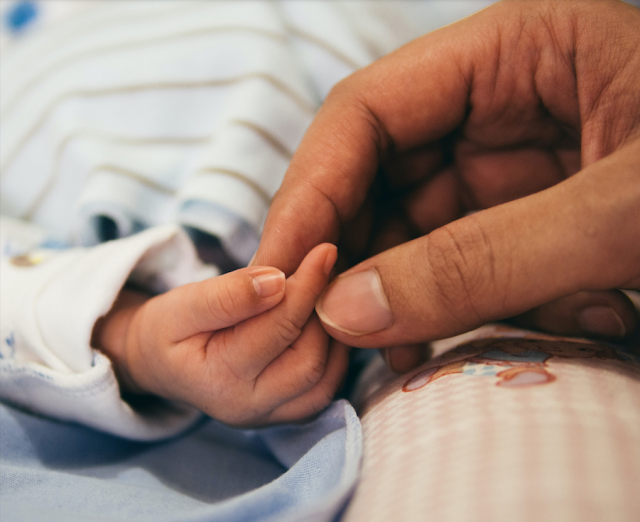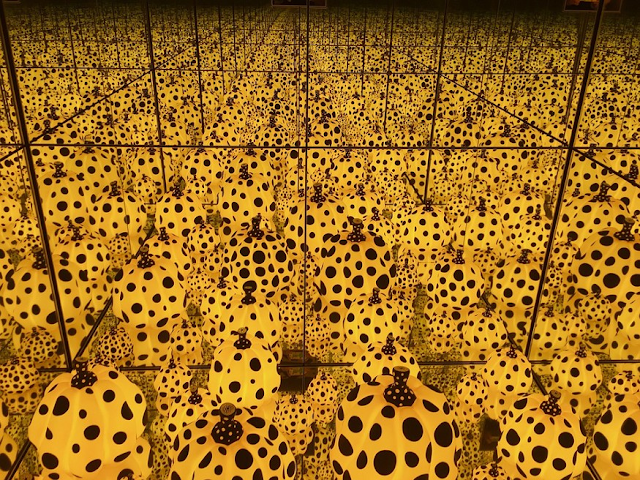The heavy soft hand of God
Psalm 32
New Ark United Church of Christ, Newark, DE
March 27, 2022
 |
| Photo of an adult hand holding the tiny fingers of an infant. |
Earlier this week I attended a webinar in which I heard this wisdom: “Healing as a mirrored room” and I wrote it down before I could really think about what it meant. As an abstract concept, a thought experiment, it sounds perfectly logical, reasonable. A human being, faced with the whole truth about themselves, would be confronted with their flaws as well as their goodness and learn to accept and embrace all of who they are.
But then I imagined what it would actually be like, to see myself from angles I’d rather avoid, or to listen to a continuous loop of my voice as others hear it, to have all of who I am mirrored back to me, and I remembered that healing, acceptance, and forgiveness are seldom easy or so simple.
Japanese artist Yayoi Kusama created mirrored rooms as art installations in places like the New York Botanical Garden and the Hirshhorn Museum in Washington, D.C. and called them Infinity Mirror Rooms. For more than 40 years she has voluntarily lived in a Tokyo hospital for those living with mental illness and created art from there. Once inside the mirrored room, the viewer becomes a participant in the visual kaleidoscope display. Blogger Kathryn Dillon writes of her experience of these mirror rooms at the Cleveland Museum of Art: “The rooms were vast and open and close and intimate all at the same time. …As I stared into the neverending horizon of the mirrors, each room tore me apart and built me back up in the most gentle and loving of ways. It was not painful or frightening, though I alternated between wanting to laugh like a hyena at the sheer joy of it and then cry like an infant at the intensity. …I saw all of humanity and how I was connected to it. And yet I saw myself and perceived how I was standing alone.”
 |
| One of Yayoi Kusama's infinity mirror rooms |
As a theologian I imagine that this is what it means to be made in the image of God: to see ourselves as God sees us, in the most gentle and loving of ways, connected yet alone, with sheer joy and with tears like those of an infant. That’s the emotion I hear in David’s psalm, from Eugene Peterson’s The Message: “Count yourself lucky, how happy you must be—you get a fresh start, your slate’s wiped clean. Count yourself lucky—God holds nothing against you and you’re holding nothing back from [her].”
Throughout his life, David knew the heavy soft hand of God. David had done some pretty horrible things—taking another man’s wife as his own, then having that man killed in battle—and yet God still loved David and forgave him of his sin. David was able to face what he had done wrong, the hurt he had caused, because he was capable of remorse. He was able to tolerate that strong emotion in his body.
Well, at first he didn’t tolerate it well at all. Again, from The Message: “When I kept it all inside, my bones turned to powder, my words became daylong groans. The pressure never let up; all the juices of my life dried up.” And then a pause, like he’s taking a deep breath. Between this and the next verse something moves within David, maybe it’s the singing of this psalm, breathing deeply in and out, connecting him with something greater than himself, like music has the power to do. Maybe that cup runneth over, that goodness and mercy caught up to him. “Then,” he said, “I let it all out; I said, ‘I’ll come clean about my failures to God.’ Suddenly the pressure was gone—my guilt dissolved, my sin disappeared.”
Clinical psychologist Dr. Raja Selvam writes that when we expand our emotional experience throughout our bodies, we are better able to tolerate the emotion for a longer period of time. “Why would we want to do that??” we might be asking ourselves. Usually, we want to avoid strong emotions like fear, anger, anxiety, grief, and sadness. We want relief from them. And so like an infant or small child we reach for someone or something to help give us relief. Sometimes we reach for something healthy or something benign or something harmful or destructive like another person’s partner or a substance or we spend money or we start a fight. Or a war.
We think we want relief when what we actually need is resolution. Instead of constricting a strong feeling in particular place in our body, instead of shutting down, when we expand the emotional experience throughout our body, we breathe better. Our blood flow is open instead of constricted. When we can tolerate strong emotions in our body, we can be more rational in that moment, we can generate more alternatives. When we regulate our emotions we lessen more destructive behaviors. We develop the capacity to tolerate opposites in our bodies: connection and aloneness, sheer joy and the tears of an infant, remorse and unconditional love.
We think we want relief when what we actually need is resolution. Instead of constricting a strong feeling in particular place in our body, instead of shutting down, when we expand the emotional experience throughout our body, we breathe better. Our blood flow is open instead of constricted. When we can tolerate strong emotions in our body, we can be more rational in that moment, we can generate more alternatives. When we regulate our emotions we lessen more destructive behaviors. We develop the capacity to tolerate opposites in our bodies: connection and aloneness, sheer joy and the tears of an infant, remorse and unconditional love.
 |
| Notebook page with these words written in black ink: You think you want to die, but in reality you just want to be saved. |
But what the last two years has taught us is that the last thing we want to do, especially in the midst of a pandemic, is expand our awareness of our body and our emotions. We want relief. We want this pandemic to resolve itself. We’re having a hard time tolerating not just one overwhelming emotion but several at once. People are acting out by engaging in all sorts of destructive behaviors like not wearing a mask when asked to, wearing it improperly, not getting vaccinated, not being cautious around others, not respecting other people’s choices, taking their anger and frustration out on others.
Gas prices are up and people are angry and frustrated; what do we do? Drive faster and more often. Last year there were 18 fatal crashes in the state of Delaware. We’re only 3 months into 2022 and already there have been 35 fatal crashes. Two pedestrians were killed last year; this year 8 pedestrians have been killed so far.
When a governing body or a nation has difficulty owning up to its wrongs, tolerating an emotion like remorse, it does things like perpetuate racism, misogyny, and transphobia. When a political party has difficulty owning up to its wrongs *cough* (insurrection), tolerating an emotion like remorse or refuses to even engage in it, it digs in its heels and excoriates a woman who is extremely qualified to serve on the highest court. When any nation cannot own up to its wrongs, tolerate its own grief and loss, its own anxiety and fear, its guilt and remorse, it constricts its oxygen, its people; it tightens its blood flow, its freedom and its authority; it overreaches; it starts a fight; it slides toward authoritarianism, toward fascism.
 |
| Poster with a photo of bell hooks surrounded by pink chrysanthemums and this quote: "True resistance begins with people confronting pain...and wanting to do something to change it." |
The ability to tolerate difficult emotions also gives us the ability to expand our bodies and hold emotions like unconditional love, compassion, and courage. Dr. Ravi Selvam reminds us, “The body is the container for the transformation of the soul.” God lays their heavy yet soft hand upon us, the full weight of what it means to love, not to our shame, not to be punitive, but to restore us to relationship and connection, at the very least with ourselves, which is where all transformation begins.
We have such difficulty tolerating both remorse and unconditional love in our bodies and yet they are some of the most powerful tools we have to heal our spiritual wounds: those we have inflicted and those that have been inflicted upon us. I don’t think it matters which one we feel first. The love makes it safe for us to feel the remorse. The remorse opens us to receive the love we had denied ourselves. The psalm reminds us that when we are capable of sustaining these big feelings within us, we are blessed, and that heavy soft hand holds us and leads us in song.
Take a moment now to feel that hand upon you. I invite you to close your eyes. Take a deep breath in and let it out. If you feel resistance to this, inquire gently to yourself why? Take another deep breath in and let it out. Take your dominant hand and place it on your opposite shoulder, as if you are comforting a friend or loved one. Give a gentle squeeze. As you continue to do this, think to yourself, “There are hurts I have caused, I am sorry, and I want to do better. I am loved and I am capable of transformation.”
Thanks be to God for a love that accepts us exactly as we are and does not let us stay stuck that way. Amen.
Go forth with curiosity and an open heart
about how your actions impact the community.
For your amend-making is blessed,
and where you have been harmed,
you are worthy of repairs being made towards you.
Go with God who goes with us.



Comments
Post a Comment